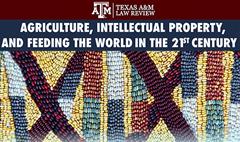 Agriculture and intellectual property law experts from around the country gathered at Texas A&M University School of Law on Oct. 28, 2016, to participate in the Texas A&M Law Review symposium,“Agriculture, Intellectual Property & Feeding the World in the 21st Century.”
Agriculture and intellectual property law experts from around the country gathered at Texas A&M University School of Law on Oct. 28, 2016, to participate in the Texas A&M Law Review symposium,“Agriculture, Intellectual Property & Feeding the World in the 21st Century.”
Speakers included scholars and practitioners specializing in agriculture and intellectual property law, as well as industry participants ranging from farm owners to non-profit directors.
This symposium was designed to highlight the law school’s commitment to leading in agriculture law and policy, and to bringing attention to new developments in this area of law.
3L Tave Doty, symposia editor of the Texas A&M Law Review, said feeding the world’s growing population while protecting the environment, improving health, and growing the economy is an important challenge faced today.
“My vision for this symposium was to build upon the legacy of agriculture at Texas A&M University, a land-grant school, and to develop solutions to the Grand Challenges issued by Texas A&M,” she said. “Bringing together experts in the seemingly different, yet closely intertwined, fields of agriculture and intellectual property law is an important step toward solving the challenges of our ever-changing and growing global food economy.”
In her morning keynote address, Professor Jennifer Zwagerman, Associate Director of the Agricultural Law Center at Drake University Law School and President-Elect of the American Agricultural Law Association, discussed consumer perception of foods that include genetically modified organisms (GMOs) and the misinformation about GMOs that is perpetuated in American society. She focused on answering a key question: “What is it going to take for consumers to believe that genetically engineered foods are safe to eat?”
Zwagerman indicated that “education, collaboration, and communication are key” to encouraging the acceptance and trust of genetically engineered foods, as well as “a recognition that there may not be a perfect system out there; it is constantly changing.”
“Science indicates that GMOs are safe, but the agriculture industry has done a poor job communicating with consumers,” she said.
At the lunch keynote, Steve Dauphin, Director of the Kirchner Impact Foundation, discussed the problems our world faces in seeking to increase the food supply to meet anticipated population growth. Noting the importance of avoiding inaccurate suppositions in regard to agriculture policy, Dauphin said that “there are three assumptions we don't have framed properly: the wrong problem, the wrong experts, and the wrong approach.”
He emphasized that increasing production yield is not the only solution to feeding the growing population; the agricultural industry must also find ways to create infrastructure to distribute food globally and decrease waste.
Dauphin added that for-profit corporations and free-market capitalism, not the government, should be relied upon to solve this predicament.
The symposium also featured two panel presentations. The morning panel explored genetic advancements in plant and animal breeding and included discussions on the ways that non-profits and farmers are working together to implement advancements in seed and soil research, as well as the intellectual property issues that technological advancements create.
The afternoon panel focused on using technological advancements to feed the world in the 21st century, including a lively discussion of strategies that producers might use to gain approval of genetically engineered foods for export, empirical data about the public perception of GMOs, and the overall need for genetically engineered foods to meet the nutritional requirements of the world’s growing population.
Attorneys, law students, and industry experts alike found the panel topics engaging and relevant, as advancements in agriculture and intellectual property will be crucial in supplying food for future generation.
“People have a farm-shaped hole in their hearts. Most of us are four or five generations removed from a farm,” said Professor Shannon L. Ferrell, Associate Professor of Agricultural Law at Oklahoma State University, on the goal of the symposium. “Farmers have a tremendous story to tell. They have to do a better job of telling their own story.”
- Article by 2L Allen Al-Haj, Texas A&M Law Review staff member.